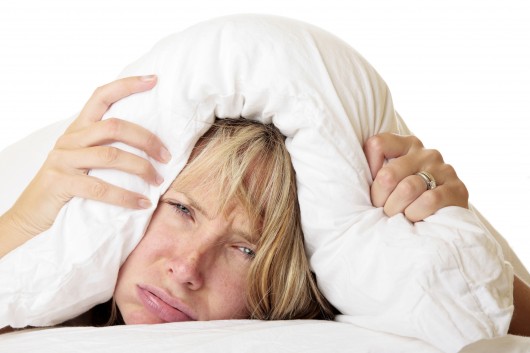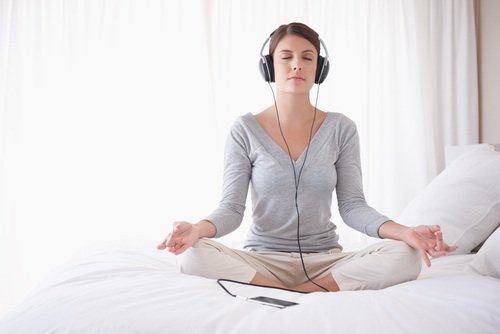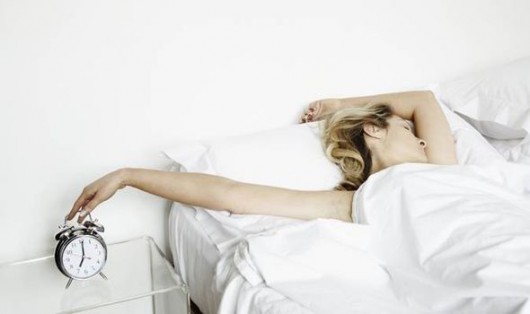Often, a good night’s sleep can be hard to come by. Sleep problems are common and can impose serious health concerns. Read on for healthy tips and tricks for a healthy and proper sleeping routine.

Fixing Your Sleep Routine and Environment
- Maintain a regular and proper sleep routine by going to bed and waking up at the same time every day.
- Keep the routine same on weekends and holidays as well so that you do not disturb the circadian rhythm of your body.
- If you sleep in late, wake up still at the same time everyday instead of oversleeping.
- Prioritize and get good hours of sleep instead of feeling guilty for heading off to bed early.
- Try to keep a sleep diary to record your sleeping and waking up timings.
- If you feel exhausted before your sleeping time, try to resist going to sleep earlier than usual.
- Your room temperature should be optimum when heading off to sleep. Too cold or hot weather can induce disturbance in the sleep and force you to wake up.
- Keep your bed comfortable. It should be of an appropriate size to allow twist and turns and not cause you to get all hunched up and uncomfortable
- Use soft pillows and sturdy mattress to ensure maximum comfort. These can ensure that your body, specifically the neck and the shoulder get firm support and not cause pain later.
- Try to change your mattress every ten years in order to avoid back pain and allergies.
- Pick a comfortable and firm kind of mattress, as a saggy mattress can lead to spinal discomfort as suggested by Spine Health.
- Try to keep your room neat, clean and comfortable by removing all kinds of distractions.
- Keep your bedroom tranquil.
- Keep your bedroom fully ventilated by allowing access of fresh air.
- Lights can disturb sleep therefore turn them all off before you go to sleep.
- Use your bedroom for only sleeping and not for watching TV or discussing bills.
- Do not keep a clock that illuminates in the dark, for keeping a check on time can cause disturbance in sleep.
- Turn off all tablets, cell phones, computers and nightlights before you head off to sleep.
- Use just the right amount of blankets.
- Wear comfortable, loose and soft clothing.
- Wear socks before heading off to sleep, as the feet have the poorest blood circulation and thus end up disturbing a good night sleep.
- Do not take up on night shifts and long commutes if you have problems sleeping.
Healthy Habits to Help You Sleep

- Relaxing yourself in a warm bath can help you achieve a comfortable good night sleep.
- If you’re not in the mood of a warm bath, try soaking your feet in warm water for a while before heading off to bed.
- Try to incorporate essential oils in your bedroom for relaxation. Essential oils like lavender oil and jasmine oil are known to have relaxing properties and can help a body relax.
- Try to drink warm milk as the calcium in milk can help relax the nervous system.
- A cup of herbal tea like chamomile, passion flower or Valerian tea can help induce good sleep.
- Have a banana before heading off to sleep as bananas can work like a sleeping pill with their nutrients like melatonin, potassium, serotonin and natural muscle relaxant magnesium.
- Melatonin, secreted by pineal gland, is a hormone responsible for controlling the circadian rhythm of the body. Lack of melatonin leads to lack of sleep and therefore, a melatonin supplement can help sleep better.
- Another rich source of melatonin is the organic oatmeal.
- Incorporate ear plugs to block disturbing noises.
- Incorporate sleeping mask to block disturbing lights.
- Intake dinner three hours at least before going to bed to allow proper digestion.
- Having a protein snack like yoghurt, organic almond butter and apples can help avoid hunger and keeping insulin balanced.
- Incorporating high protein in your dinner can help induce tryptophan, melatonin and serotonin, the three major components that work as sleeping aid as proven by Hartmann, National Sleep Foundation and Medical News Today respectively.
- Including fresh fruits, vegetables and lentils in your daily diet can promote a good night sleep.
- Intake of nutrients like Vitamin B12, B13 and Folic Acid improve the quality of sleep.
- A glass of water on a bedside table can help maintain a goodnight sleep as you will not have to get up during the night for fetching water if thirsty.
- Maintain a good hygiene for healthy sleep
- Sex life can help a body relax itself to restful sleep easily.
Relaxation Therapies

- Treat yourself to a massage for muscle relaxation before heading off to sleep.
- Try to indulge in deep breathing in order to reduce tension and lower heart rate.
- Meditate in order to clear your thoughts, relieve tension and get a good night sleep.
- Treat your bedroom to color therapy by incorporating soothing colors in your room to relieve yourself of emotional and physical sleep disturbances. Colors like white, blue and pastels can have a soothing affect on the mental state of the human body.
- Treat yourself to music for calming and relaxing yourself before heading off to sleep.
- Read a book or listen to audio tapes to help you sleep better by relaxing yourself.
- Imagine yourself in a happy place in order to help you sleep better.
Things to Avoid Before Sleeping

- Do not drink alcohol as alcohol reduces the quality of sleep. Prior to contrary belief, alcohol does not relax a system but actually disturbs it according to a research led by DrinkAware UK.
- Do not drink caffeine for it activates the mind and body and we are seeking quite the opposite.
- Do not take any sugary stuff like cookies, sodas and cakes for they can disrupt your quality of sleep as well.
- Do not smoke before heading off to sleep as it causes a release of adrenaline responsible for keeping your body awake.
- According to National Sleep Foundation, avoid exercise as it stimulates activation instead of relaxation within the body.
- Avoid watching movies or TV within the bedroom or before sleeping, as they can tamper with your eyesight as well as sleep induction.
- Avoid too much fluid intake before bedtime as it may cause frequent urination.
- Do not ingest heavy meals before sleep which your body may not be able to digest on time.
- Avoid consuming unhealthy fats in your diet, as fat can take several hours for digestion.
- Avoid fighting or arguing with friends or family members before sleeping.
- Avoid sleeping with a pet as it may result in allergic and disturbed sleep.
- Avoid doing household activities or office work at least an hour before sleeping in order to avoid stress and calm down the mental activity.
- Do not make or answer phone calls in bed.
- Try to remove smoke or smelly food from the bedroom before sleeping.
- Obesity can cause breathing and health concerns therefore maintain a healthy weight.
Incorporating Daytime Habits

- Do not nap or sleep for long during the day as sleep during the day can lead your genes into a disarray as discovered by a new research presented at the National Academy of Sciences.
- Exercise for at least half an hour daily.
- Try to intake a healthy amount of sunlight every day for a proper Vitamin D exposure.
- Drink plenty of water, at least eight to ten glasses every day.
- Keep your iron levels in check as iron deficiency leads to sleep inhibition.
- If you slept in late however, try to make up for lost hours through power naps of maximum twenty minutes and not more, as longer intervals of sleep can disrupt your circadian rhythym.
- Allow the inlet of bright light and sunlight exposure within the house during the day.
Healthy Tips in Bed

- Avoid lying in bed for long after waking up because it can cause lethargic behavior within the body.
- Avoid lying in bed if you cannot sleep. Try to engage yourself in other activities in the while.
- Stop worrying or thinking about past or future outcomes before sleeping.
- Try to think of anything that may help you from not thinking about your troubles.
- Sleeping positions are also important. So try to sleep in a straight position lying on your back as it does not pressurize your vital organs and allows a proper sleep, kidney as well as liver function.
- Never sleep on your stomach as it suppresses your organs and causes shallow breathing.
- Use ear plugs if your partner snores.
- Do not go to sleep in pain. Treat your pain first wherever it may be located.
- Place a pillow under your legs to reduce pressure in lower back.
- Do not watch the clock as counting hours can lead to lack of sleep.
- Sleep with your clock facing in the opposite direction.
- Avoid movies and books of suspense, murder or thriller genre as they can activate and stimulate your mind.
- Avoid mental mathematics to keep the brain relaxed.
- Change your sleep timings if the insomnia is consistent.
- Do not change sleeping locations and places.
- By closing your eyes and rolling them upwards three times you can induce a natural sleeping trigger of the human body.
Getting Professional Help

- Incorporate light therapy by exposing yourself to light for specific time duration for promotion of normal circadian sleep.
- Sleeping pills are the last resort and consult a healthcare professional before going for them.
- Do not use over-the-counter medications.
- Get your medicines checked out as it is possible the ones you may be using are causing sleep disturbances.
- Get your cortisol levels tested and seek counseling if stress doesn’t let you sleep.
- Never neglect your depression. Get it treated as it causes lack of sleep.
- If anything feels out of ordinary, get professional help.
Tips for Sleeping Disorders
- Sleep apnea is obstruction of breathing during sleep, and therefore it is recommended to keep your nasal passage clear at night before sleeping.
- Restless Leg Syndrome is the uncomfortable leg sensations and can be treated by stretching or walking every day twice during the day.
- Circadian Rhythm disorder is the disturbance in the natural sleep cycle of the body and can be treated with the help of melatonin or bright light therapy.
- Disruption in thyroid levels can also cause sleep loss and thus relevant medication can help prevent sleep disorder.
- Adrenal disorder causes the affected to wake up at 3 in the night with the inability to go back to sleep and monitoring and treatment of cortisol levels can therefore help a lot.
- Night sweats can be avoided with the avoidance of spicy foods, caffeine, unhealthy fats and alcohol.
- Fibromyalgia is the pain in shoulders, neck, hands and backs and can be treated with the help of stretching exercises and massages to avoid sleep disruption.
- Exhaustion can also cause poor sleep and thus care should be taken to unwind from daily chores.
- Diseases like heartburn or GERD can also cause poor sleep, and thus special treatment measures should be taken to avoid disease triggers.
Almost everyone suffers from poor sleep every now and then. If you have trouble sleeping often, get professional help. In the meantime, try to incorporate these healthy tips into your daily routine for sleeping peacefully and comfortably.



